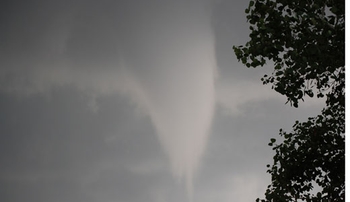Disasters can happen any time.
That’s why hospital and public health workers and businesses must be prepared to deal with a number of injuries that could overwhelm local resources.

|
| Tornadoes and other disasters have the ability to put immediate and overwhelming stress on health care systems. A new program in the College of Public Health will help health care professionals better prepare for such occurrences. |
Now, that training will be available next fall at UNMC College of Public Health. It will be the Midwest’s first master of science degree program in emergency preparedness and one of only about 20 such programs in the United States.
The new program was approved by the University of Nebraska Board of Regents at Friday’s regular board meeting. It joins the master’s of public health degree as the second master’s program in the College of Public Health.
Program leaders
Co-directing UNMC’s program are:
- Philip Smith, M.D., professor of infectious diseases and special director of biosecurity and biopreparedness; and
- Sharon Medcalf, instructor of health promotion, social and behavioral health, and associate director of the Preparedness Education program.
“After 9/11, health care professionals became more tuned into the need for disaster preparedness planning,” Dr. Smith said. “They are planning and communicating more with each other and with others in the community to enlist additional resources, if needed.”
Rapid destruction
A train derailment, gas leak evacuation, a tornado — any of these disasters could easily overwhelm a hospital and a community, Dr. Smith said. An emergency preparedness plan will help hospital workers know how to respond.
The 36-credit-hour program is based on the Public Health Preparedness and Response Core Competency Model as outlined by the Centers for Disease Control and Prevention (CDC).
The core courses are structured based on the four mission areas for the Department of Homeland Security:
- Prevent;
- Protect;
- Respond; and
- Recover.
It will focus on the general principles of planning and practice for public health and medical response and will be available through distance learning.
UNMC center continues to grow
The master’s program is the latest outgrowth from UNMC’s Center for Biopreparedness, Biosecurity and Emerging Infectious Diseases, Dr. Smith said.
It has a different focus from emergency management courses that train first responders, such as fire and police, he said.
“Emergency preparedness is a complex and evolving field,” Dr. Smith said. “It’s a matter of ‘when,’ not ‘if’ a disaster will hit. We all have to be prepared.”